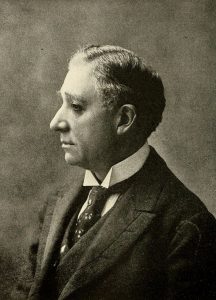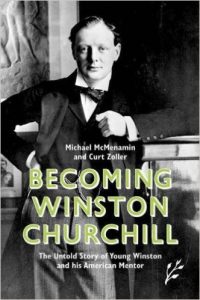Cockran: A Great Contemporary
Q: How important was Congressman Bourke Cockran’s influence on the young Churchill?

A: Very. The late Curt Zoller was the first to write in depth about Bourke Cockran. This man played a vital but little understood role in forming young Churchill’s political philosophy. In 1895, Zoller wrote, when young Churchill traveled to New York on his way to Cuba,
…he was greeted by William Bourke Cockran, a New York lawyer, U.S. congressman, friend of his mother’s and of his American relatives. Winston’s Aunt Clara was married to Moreton Frewen. (The peripatetic “Mortal Ruin” would later badly edit Churchill’s first book, Story of the Malakand Field Force.) For many years Frewen had been a friend of Cockran, who would grow to become one of Winston Churchill’s lifelong inspirations.
Churchill later wrote of “the strong impression which this remarkable man made upon my untutored mind. I have never seen his like, or in some respects his equal. With his enormous head, gleaming eyes, flexible countenance, he looked uncommonly like a portrait of Charles James Fox. It was not my fortune to hear any of his orations but his conversations, in point, in pith, in rotundity, in antithesis, and in comprehension, exceeded anything I have ever heard.”
Cockran’s Influence
 The New York congressman, therefore, was crucially important. Churchill based much of his domestic political philosophy, particularly his lifelong belief in Free Trade, on Cockran’s thinking. Thanks to Churchill’s his capacious memory, he was still quoting Cockran’s famous line, “the earth is a generous mother,” forty years later. In the 1950s, Churchill told Adlai Stevenson, Democrat nominee for President in 1952 and 1956, that his model was a Democrat congressman. Stevenson had to be reminded of who Cockran was.
The New York congressman, therefore, was crucially important. Churchill based much of his domestic political philosophy, particularly his lifelong belief in Free Trade, on Cockran’s thinking. Thanks to Churchill’s his capacious memory, he was still quoting Cockran’s famous line, “the earth is a generous mother,” forty years later. In the 1950s, Churchill told Adlai Stevenson, Democrat nominee for President in 1952 and 1956, that his model was a Democrat congressman. Stevenson had to be reminded of who Cockran was.
In 2007 Curt Zoller teamed with Michael McMenamin to write Becoming Winston Churchill: The Untold Story of Young Winston and his American Mentor. This excellent book is well worth a read, thorough and accurate.
Recently a Churchill author named 1899 as the pinnacle of young Winston’s development. Perhaps, but 1895 was far more influential. I always like to quote the eloquent Robert Pilpel, author of Churchill in America (1977):
We can never know for certain how a person would have developed if one or another aspect of his life had been different. But what is clear with regard to Churchill—as his letters at the time and his writings in later years attest—is that a life which before 1895 seemed destined to yield a narrow range of skimpy achievements became from 1895 onwards a life of glorious epitomes and stunning vindications.
Credit Bourke Cockran, New York’s overflowing hospitality, the railroad journey to Tampa and back, or the rampant vitality of a nation outgrowing itself day by day. Credit whatever you will, but do not doubt that Winston’s exposure to his mother’s homeland struck a spark in his spirit. And it was this spark that illuminated the long and arduous road that would take him through triumphs and tragedies to his rendezvous with greatness.







One thought on “Cockran: A Great Contemporary”
Wonderful. I don’t think there is any doubt that Churchill felt in his bones that Britain would never be alone and that the strength and goodness of the USA would always be there, as it were in reserve, to anchor the English-speaking peoples.
Comments are closed.